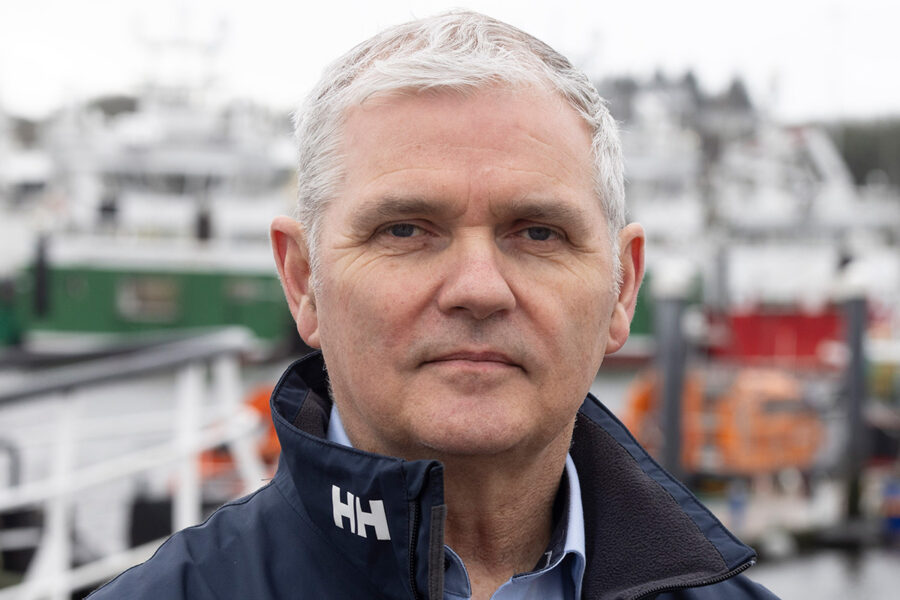AODH O DONNELL, CEO of the Irish Fish Producers’ Organisation offers an Irish perspective on the recent UK-Norway-Faroe mackerel deal
The UK’s Trilateral deal with Norway and the Faroe Islands is raising concerns in Ireland about overfishing of mackerel in the North East Atlantic. We acknowledge the UK’s sovereign right to strike agreements with non-EU coastal states. But are these agreements based on sustainable Nordic quotas, or will they damage us all in the long term?
Despite Brexit, Ireland maintains a close and longstanding relationship with the UK fishing sector. This is particularly so for the migratory pelagic fleets, many of whom are based in Scottish ports. We enjoy strong cultural and commercial links with our closest neighbours. Our neighbouring UK pelagic sector are beneficiaries of the enormous mackerel transfers from Ireland under the Brexit agreement. Yet there is a strong empathy at UK fleet level for Ireland’s current perilous situation.
Ireland has failed to benefit from any meaningful rebalancing of the post-Brexit fishing agreement. In this deal, Ireland contributed 40% of the total European transfer value to the UK, and 26% of our pelagic quota. Europe negotiated this agreement, and in so doing, utterly failed to achieve a level playing field for Ireland.
In parallel, our Nordic neighbours have unilaterally and unsustainably increased their self-allocated mackerel take massively for several consecutive years. This is threatening the sustainability of this species for all concerned.
Europe has lost ground, whilst these states have acted irresponsibly in a process that threatens our shared stock. Europe maintains a commitment to responsibly following scientific recommendations. Yet this course of action is abused, and certain coastal states have failed to enter a comprehensive and responsible mackerel sharing agreement.
It is important to recognise and acknowledge that the UK is a sovereign state with control of its own waters. It is now a third-country coastal state, and is taking firm decisive steps to enhance the economic interests of its own fishing communities.
However, the recent three-year access agreement announced with Norway and the Faroe Islands is a serious cause of concern. This trilateral deal gives them access to UK waters to extract 154,000t of premium mackerel annually. Many view this as an endorsement by the UK of a process of systematic overfishing by the Nordic parties to this deal.
Adverse market impacts have also been predicted. The stock caught in UK waters by third countries will potentially displace or impact value chains for UK mackerel in premium international markets.
The EU must address what appears to be gross hypocrisy from some coastal states. They claim zonal attachment for migratory species such as mackerel, but ignore the reality of stock distribution for mackerel and species like blue whiting. In addressing this rogue behaviour in mackerel, we advocate negotiating across other stocks. Withdrawal from the EU-Norway blue whiting access arrangement is worth consideration. Norway relies on the enormous blue whiting share it catches off the west of Ireland to sustain its vast salmon feed sector.
In raising these issues, our battle is not with the UK, and we want to maintain an open dialogue with our neighbours. The Trade and Co-operation Agreement is an important element of our strong linkage with the UK as a sovereign state. However, we have serious and legitimate concerns about coastal states who do not obey or apply sustainable practices. So we call on Ireland and other EU member states to forcefully challenge the latest UK, Norway and Faroe Islands trilateral deal.
Specifically, we need to secure a commitment from all coastal states to comprehensive sustainable stock management. In the short term, we want Ireland’s marine minister to support the call from other member state industry representatives for the EU to maintain its historic share of the mackerel stock. Furthermore, the systematic establishing of bogus track records and the cynical trading of overfished transfers must be robustly challenged with a suite of select trade measures.
We fully endorse the recent call by the European Association of Fish Producers’ Organisations (EAFPO) for ‘all coastal states to resume their consultations on a comprehensive sharing arrangement that should reflect genuine, sustainable track records and interests’ and ‘for the European Commission and the Council of the EU to take concrete action against the setting of excessive, artificially increased unilateral quotas and make use of the instruments at their disposal, such as trade measures’.
Ireland is heartened by emerging cohesion of the fishing industry at European level. An exciting opportunity presents itself with the election of a new parliament and the appointment of a new college of commissioners. The EU has strong leverage to drive long- term sustainability and food sovereignty. All that is required is a political will to protect its peripheral coastal communities. Otherwise, the European Common Fisheries Policy ultimately fails to deliver.
This story was taken from the latest issue of Fishing News. For more up-to-date and in-depth reports on the UK and Irish commercial fishing sector, subscribe to Fishing News here or buy the latest single issue for just £3.30 here.
Sign up to Fishing News’ FREE e-newsletter here.








